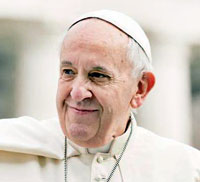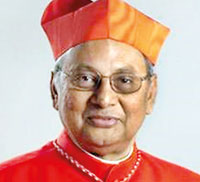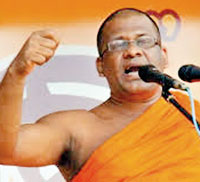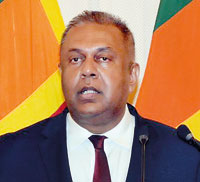Columns
Execute them, says the Archbishop: Hang the lot, says Bodu Bala pope
Coming from President Sirisena, well known for his rhetorical flourishes spurred by his new found urge to portray himself as a no nonsense leader of iron, his speech this Wednesday in Kandy when he declared he will sign the death warrant and hang those convicted drug dealers sentenced to death by the courts but commuted to life and spared the hangman’s noose thereafter by him, came as no surprise.
 It was only to be expected. Given the failure of his advisors to bring to his notice that he had no legal right to do so. Unless he wished to play judge, jury and hangman all by himself and have his actions challenged in court.
It was only to be expected. Given the failure of his advisors to bring to his notice that he had no legal right to do so. Unless he wished to play judge, jury and hangman all by himself and have his actions challenged in court.
President J. R. Jayewardene kept the death penalty in the constitution he introduced in 1978. But given his vision of dawning a ‘dharmishta yugaya’ in the land, he never signed the death warrant but commuted it to life. Though he was forced to wage a war against the Tigers and order the Armed Forces to do what they had to do to protect the unitary status of the nation, he did not wish to have blood on his hands when it came to decreeing a man be hanged.

PRESIDENT: I will sign the death warrant
For the Buddhist law of karma does not recognise motive as justification. Nor absolves a person from the act of taking the life not only of a human being but of all beings, however commendable in human eyes it may appear to be, from the consequences that will inevitably follow him life beyond life. The intention to kill, coupled with the tools to kill a living being inexorably attracts the natural law of cause and effect to take effect.
Since JR, all presidents of Lanka have dutifully observed this precept and precedent and have commuted the death sentence issued by the courts to life imprisonment. So has Sirisena. Until now when he declared this July 11, “Although there are different opinions regarding capital punishment in a Buddhist society, if a large number of criminal acts spread in such a society despite religious sermons, it will be necessary to take some timely actions to control crime.” And proceeded to say, “I will sign the required orders to execute capital punishment for convicted drug traffickers, who carried out large-scale drug smuggling operations, while in detention.”

“No matter how serious the crime committed, the death penalty is inadmissible” POPE FRANCIS:
But does he have the legal right to do so?
The procedure in giving effect to President J. R. Jayewardene’s inhibition to personally condemn a man to death whatever his crime was is as follows:
Take the procedure involved. Before the President commutes the death sentence to life imprisonment, he is required to call for reports from the Attorney General and the Trial Judge and they are thereafter submitted to the Minister of Justice who in turn submits them to the President with his advice whether or not the execution should be carried out. It’s only then the president must decide whether or not to commute the sentence of death to one of life in jail. Once he so decides, it’s hard to see how he can possibly and arbitrarily reverse his decision and reimpose the death sentence. It can only apply to future cases, not to those presently in jail who have been given a reprieve from death.
But once he decides between life and death and signs the imperial order — like a Roman Caesar with the power over life and death to give the thumbs up or the thumbs down at a gladiators’ fight in a Roman arena, where the victor awaits with sword held poised against the vanquished breast of his fallen foe and looks toward the royal box for a thumbs up or thumbs down signal from Caesar whether to plunge the sword in or sheath it — there are no grounds to revoke it. Legally and morally.
For commutation of the death sentence to one of life imprisonment is not a stay order on the death penalty.
For what he signs is not a decision that can be revoked or enforced at his whim, fancy and pleasure but one which states with the presidential signature and stamped with the presidential seal of office upon it, is that a man so sentenced to death by the judicial courts shall not be hanged but be allowed to live, albeit in a prison cell for the rest of his natural life.
Last year on February 4, President Maithripala Sirisena commuted 60 prisoners who were on death row in jails to life imprisonment. There may have been drug traffickers amongst those who received reprieve. Can the President by any means revoke the commutation order he had signed on the recommendation of the then Justice Minister and order they be hanged now because those drug pushers are still dealing in drugs behind prison bars?

“I welcome the death penalty” ARCHBISHOP MALCOM
So much for the President’s call for the resurrection of the gallows and its noose to hang around the neck of those who he himself and other presidents before him for the last 40 years had spared even though the courts had sentenced them to death. But given his recent vacillations on many fronts, perhaps it was only to be taken with a pinch of salt, as another expression of a trouble mind.
The shock lay elsewhere and came like a bolt from the Heavens. When the head of Lanka’s Catholic Church, without any reason or rhyme, deemed fit to step forth uninvited from his Archbishops’ Palace, to join hands with Sirisena and advocate judicial murder.
If coming from a politician such as Sirisena held no surprise to the masses when he declared death to those who had been sentenced to hang whom he himself had pardoned and given new lease of life to spend in jail, the call coming from a cardinal in a red cassock representing the catholic church in Lanka, was — to put it mildly — astonishing. And beyond belief. And perhaps against the stated position the Holy See takes on the issue of the death penalty.
And, perhaps, ill advised like President Sirisena, the Archbishop of the Catholic Church, His Eminence Cardinal Patabendige Don Albert Malcolm Ranjith, rushed in where angels fear to tread. And perhaps by calling for the death penalty to be revived and the offenders hanged, he hanged his own chances to become the Third World’s first South Asian Pope.
Two days after Maithripala Sirisena had declared his decision to revisit drug dealers in prison and deliver to them the hangman’s noose, the Archbishop of Colombo, the head of the Catholic Church in Lanka, sauntered in unannounced to give his gratuitous sermon from his pulpit. He said: “We welcome President Sirisena’s decision to execute drug traffickers who have been sentenced to death. We will support Maithripala Sirisena’s decision to subject those who organise crime while being in the prison to death sentence.”
Astonishing, isn’t it that a man of God should call without qualm for the resurrection of the hangman’s gallows – for whatever reason – when his own saviour the Lord Jesus Christ, the Son of God, was arrested over the allegation levelled at his door that he professed to be the King of the Jews. And given the death penalty by the Romans due to the clamouring of rabid mob who demanded his blood; and, after agreeing to the mobs demand, the fifth Prefect of the Roman province of Judaea, Pontius Pilate washed his blood soaked hands in water to cleanse his indelible sin, and crucified Jesus on the cross purely out of political expediency.

“Hang the politicians too” BODU BALA BOSS
Funny, isn’t it, that when Jesus intervened to prevent a woman accused of adultery being stoned to death by stating ‘he who is without sin, let him cast the first stone’, an archbishop should call for the death penalty? Especially when the Holy Father of the Vatican Church the Archbishop represents in the Lankan archdiocese, does not subscribe to his views on crime and punishment.
Nine months ago, His Holiness Pope Francis presented the Catholic Church’s infallible view. He declared that the death penalty, no matter how it is carried out, “is, in itself, contrary to the Gospel.”
Speaking at the 25th anniversary of the Catechism of the Catholic Church at the Vatican in October last year Pope Francis said, “The catechism’s discussion of the death penalty, already formally amended by St. John Paul II, needs to be even more explicitly against capital punishment.”
Capital punishment, he said, “heavily wounds human dignity” and is an “inhuman measure.”
“It is, in itself, contrary to the Gospel, because a decision is voluntarily made to suppress a human life, which is always sacred in the eyes of the Creator and of whom, in the last analysis, only God can be the true judge and guarantor.”
“The death penalty,” he said, “not only extinguishes a human life, it extinguishes the possibility that the person, recognising his or her errors, will request forgiveness and begin a new life. In the past, when people did not see any other way for society to defend itself against serious crime and when ‘social maturity’ was lacking, people accepted the death penalty as ‘a logical consequence of the application of justice’.”
In fact, he said, the church itself believed that, and the death penalty was a possible punishment in the Papal States. It was only in 1969 that Pope Paul VI formally banned the death penalty.

“I am against resuming execution.” MINISTER MANGALA
“Let us take responsibility for the past and recognise” that use of the death penalty was “dictated by a mentality that was more legalistic than Christian,” Pope Francis said. “Remaining neutral today when there is a new need to reaffirm personal dignity would make us even more guilty.”
The development of church teaching, Pope Francis insisted, is not the same as contradicting or changing church teaching. “Tradition is a living reality and only a partial vision would lead to thinking of ‘the deposit of faith’ as something static.”
“The word of God,” he said, “cannot be saved in mothballs as if it were an old blanket to protect against insects.”
The Christian faith, he said, always has insisted on the dignity of human life from the moment of conception to natural death. So, the church has a continuing obligation to speak out when it realises something that was accepted in the past actually contradicts church teaching.
“Therefore, it is necessary to reiterate that, no matter how serious the crime committed, the death penalty is inadmissible, because it attacks the inviolability and dignity of the person,” Pope Francis said.
But to be fair to the Archbishop Malcolm Ranjith whose statement calling for the revival of the death penalty may have been contrary to the present Catechism as held by the present Pope in the Vatican and more in line with the Lankan President, he also stated:
“We understand that even prison officers also support the criminals to organise crime while in prison and therefore it is our belief that political leadership of the country should carry out investigations and penalise the prison officers as well if they are found helping the inmates to carry out various crimes.”
What a pity he failed to confine himself to this statement instead of calling for the death penalty contrary to the present declared position of his church as expressed by his Pope “that, no matter how serious the crime committed, the death penalty is inadmissible, because it attacks the inviolability and dignity of the person.”
But the Archbishop had company. And it came from one garbed in the Buddha’s saffron robe professing to practise the teachings of the Enlightened One who had proclaimed that all life was sacred and that no one had the right morally or legally to take the life of another and that included the life of all beings.
Not to be outdone by the Archbishop’s call, Lanka’s self elected Buddhist Pope, Bodu Bala Sena Boss Galagodaaththe Gnanasara stepped in to add support to the Archbishop’s call. Only he went further. He called for the execution not only of drug dealers but also demanded that of the politicians. “Hang the lot’, he said at a televised news conference this week.
But the monk presently out on bail following his conviction last month for intimidating a woman, was also not alone.
According to the Buddha Sasana Minister Gamini Jayawickrama Perera who readily endorsed the President’s call to revive the death penalty, the Mahanayakes and the Anunayakas too backed the proposal to the full.
He said on Tuesday: “As the Ministry of Buddhasasana, I never take decisions on my own. My Chief advisers are Mahanayakas, Anunayakas and Lekakadhikari Theras including the Maha Sangha. The Maha Sangha had agreed to the decision taken by the President and approved by Cabinet Ministers who had decided to implement the death sentence for drug traffickers including those who have been already sentenced to death in prisons.”
The Buddha Sasana Minister added, “It should have been carried out fifteen years ago.”
At the same time the President too had good company. On Thursday, he received unexpected support from Philippines President Rodrigo Duterte who lauded him for Lanka’s plans to replicate the success of the Philippines’ war on drugs.
President Duterte’s spokesperson Harry Roque announced at a press conferance held on Thursday, “Of course, we are happy that other countries have taken note of our war on drugs and that they look upon us as best practice on dealing with illegal drugs. So we appreciate that, but as of now, we still have no death penalty. Well, I think, we have not reached the point where we will hang them. We are still on the level of really using our police, the Philippine Drug
Enforcement Agency, the National Bureau of Investigation and our political will against drug pushers.”
Of course, why need the death penalty, when Duterte’s policy has been to order his forces to kill any suspected drug dealer.
But one lone voice rang out from Sirisena’s cabinet. The liberal voice of his own Finance Minister Mangala Samaraweera who was bold enough to express the dissenting view. He said: “I am against resuming execution. What is needed is to take action against the main culprits responsible for running the drug cartels in the country. The ones that are in the prison are not the ring leaders; they are just peddlers and second level dealers. The big ones are hidden behind charity work, affluent social work organisations and religious organisations — we need a system to catch them with enforcing law and order in full force.”
\ Exactly. Statistics show the death penalty has not deterred murderers or assassins from killing. Nor drug lords from drug trafficking. If the government finds that convicted drug dealers are still trafficking in drugs whilst behind bars, is the answer the reimposition of the death penalty or to prevent them from doing so in prison?
For what is the credibility of the government’s claim that they have brought down the rate of crime in the country committed by those free and not under constant surveillance when the government shamelessly announces – without realising its import that it amounts to gross negligence – that they cannot even control crime committed by those in government custody under a 24/7 prison watch?
The question posed herewith is not to ask whether drug dealers should be hanged or not but to ask whether the president has the legal power to reimpose the death penalty on his own accord on those whose death sentences have been commuted to life imprisonment;
whether the Catholic Archbishop is right in singing hymns of praise to the president’s decision to reintroduce the death penalty contrary to his own Pope, Pope’s Francis’ stated view ‘ expressed just nine months ago that ‘no matter how serious the crime committed, the death penalty is inadmissible;’
whether it is right of a Buddhist monk, the Bodu Bala chief Gnanasara to publicly call for the execution of not only drug dealers but politicians too;
whether it is right of the Buddha Sasana Minister to embrace the death penalty and state that the Mahanayakes, too, support the move to bring back the gallows and hang the lot contrary to not only the Buddha’s teachings and precepts but to the example he set when he embraced to the Buddhist order a serial killer Angulimala who had killed 999 men and thereafter guided him on the path to attain nirvana;
and whether it is necessary for this nation, after having being vegetarian for over 40 years to take to eating beef again? In spite of Buddhism’s first precept ‘refrain from killing all beings’ and Catholicism’s first commandment ‘thou shall not kill’?


Leave a Reply
Post Comment